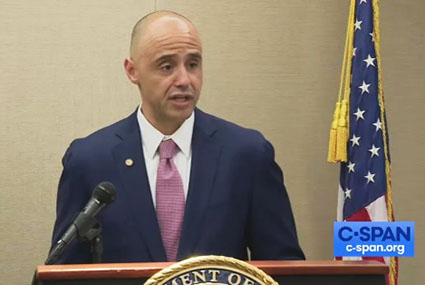by WorldTribune Staff, March 21, 2024
The Supreme Court next month will decide if the Department of Justice’s use of 1512(c)(2), obstruction of an official proceeding, to charge hundreds of Jan. 6 protesters was illegally applied.
In response, the DOJ has vowed that it will pursue more prison time for those who have been convicted of the charge who seek reduced or vacated sentences.

“Make no mistake — this is (DC U.S. Attorney Matthew) Graves’ way of threatening J6ers sentenced for DOJ unlawful use of 1512c2: if you ask for release or reduced sentence based on SCOTUS’ likely reversal of obstruction count, we’ll figure out a way to make you serve MORE time,” investigative reporter Julie Kelly noted in a March 20 thread on X. “And most DC judges will be only too happy to comply.”
The Supreme Court in December granted certiorari in Fischer v. USA to consider the DOJ’s use of the obstruction charge which has been leveled against more than 330 J6 protesters. Congress passed 1512(c)(2) in the aftermath of the Enron/Arthur Anderson accounting scandal.
The obstruction of an official proceeding count also represents half of special counsel Jack Smith’s J6-related indictment against former President Donald Trump.
“Most legal observers, even the most reliable J6 propagandists, expect the highest court to overturn how prosecutors and at least 17 D.C. judges on both the district and appellate court weaponized the law against J6 protesters,” Kelly noted.
In anticipation of a reversal by the Supreme Court, some judges have released J6 defendants currently incarcerated on a 1512(c)(2) conviction while other judges have delayed sentencing until the matter is resolved.
Beryl Howell, the former chief judge of the district court in Washington, recently signaled that the courts are preparing for a flood of motions this summer from individuals impacted by the obstruction count.
“I am hearing from my colleagues that people facing sentencing on 1512(c)(2), facing plea offers to 1512(c)(2) are looking for postponements until after the summer term of the Supreme Court is over. It’s not unreasonable,” Howell said during a hearing last December for a J6er who had accepted a plea deal.
Howell advised prosecutors to seek a plea agreement on a separate charge. “We have to move the cases along. Otherwise what is June, July, and August of 2024 going to look like for all of the judges of this court, government, let alone counsel, defense counsel.”
Kelly noted that what Howell suggested was new sentencing enhancements. “They will not accept defeat on 1512c2—in fact, they will instead punish those seeking justified relief,” Kelly wrote.
In a March 19 filing, Graves opposed the release of Anthony Williams, a J6 defendant serving a 60-month prison term for convictions on 1512(c)(2) and the four most common misdemeanors. (The sentence also involved an enhancement routinely applied to those convicted of 1512(c)(2); the D.C. appellate court earlier this month ruled the DOJ and D.C. judges unlawfully added the enhancement in over 100 cases.)
Graves warned that if the Supreme Court overturns 1512(c)(2), paving the way for defendants to seek either vacated or reduced sentences, the government will simply seek more prison time for other convictions.
“Even a reversal of Williams’s 1512(c)(2) conviction based on the ultimate outcome of Fischer would not necessarily reduce his sentence,” Graves, appointed by Joe Biden in November 2021, wrote. “[In] the absence of a 1512(c)(2) conviction, the government’s sentencing recommendation would likely be different and could include a request for consecutive sentences on Williams’s misdemeanor counts (up to thirty-six months).”
Prison sentences on multiple convictions are usually served at the same time. For example, Judge Howell, also overseeing the Williams case, sentenced him to 60 months in prison for the 1512(c)(2) conviction; 12 months each for two misdemeanors; and six months each for two other misdemeanors. Howell ordered the sentences to “run concurrently.”
But Graves is threatening 1512(c)(2) defendants who go to court asking for reduced jail time on multi-conviction cases that the government will simply go back to the judge and ask for prison sentences to be stacked on top of each other.
In other words — don’t you dare.
“So to recap: if a J6er is in prison now on 1512c2 and other offenses (mostly misdemeanors) and asks for release, DOJ will respond with request for consecutive (not concurrent) sentences and enhancements where applicable on other offenses,” Kelly added. “For now, those seeking release under Brock (the appellate order reversing one enhancement), DOJ will respond with a request for other enhancements.”
